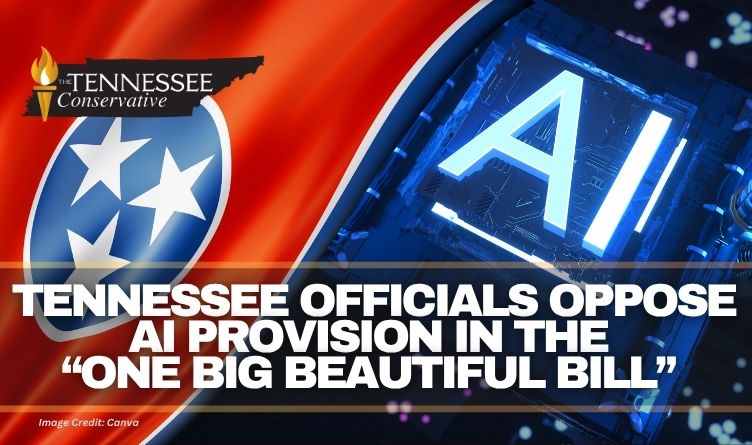Image Credit: Canva
The Tennessee Conservative [By Olivia Lupia] –
With the U.S. Senate finalizing its version of President Trump’s “One Big Beautiful Bill” Act (BBB) after it sailed through the House’s first vote, several Tennessee officials have risen in opposition to a provision which would prohibit states from regulating artificial intelligence (AI) for a decade.
17 Republican Governors signed a letter challenging the AI regulation moratorium, with Tennessee’s Governor Lee joining those of Alabama, Alaska, Arkansas, Georgia, Idaho, Iowa, Louisiana, Missouri, Montana, Nebraska, North Dakota, Oklahoma, South Carolina, South Dakota, Utah, and Wyoming.

While extolling the BBB overall as “very strong” legislation, the letter states the moratorium is “one small portion of it that threatens to undo all the work states have done to protect our citizens from the misuse of artificial intelligence.”
Several states have recently passed legislation enacting various levels of protections for citizens against dangerous misuse of AI, and leadership from these states is concerned that the BBB’s broad definitions would “prohibit these commonsense protections from going into effect for ten years, instead waiting on some as-yet-unwritten regulations to come from Congress.”
In Tennessee, several laws have been implemented addressing the exploitation of AI including SB0741 which criminalizes AI-generated child pornography, the ELVIS Act to protect artists and musicians from AI theft, and SB1711 which requires public schools and universities to establish policies for the use of AI.

After asking both Senate and House leadership to strip the AI provision from the bill, the letter recognizes that, “AI dominance is the next front in industrial competition between the United States and Communist China…But America should not sacrifice the health, safety, and prosperity of its people in this fight. We must curb AI’s worst excesses while also encouraging its growth, which is exactly what states have done through the creation of their own regulatory frameworks.”
It concludes with a reminder that states have the right to protect their citizens and they should be allowed to “function as the laboratories of democracy they were intended to be and allow state leaders to protect our people.”
But Governors are not the only elected officials to take a stand against this portion of the BBB.
Tennessee Senator Marsha Blackburn voiced her disapproval in a post on X, “For decades, Congress has proven incapable of passing legislation to govern the virtual space. To protect vulnerable individuals from being exploited by Big Tech, I’ve led the fight to pass bills like the Kids Online Safety Act and the Open App Markets Act. Blocking states from regulating AI without a national standard in place would hand another victory to greedy Big Tech companies who put profits over people. We can’t let this happen.”
TN Attorney General Jonathan Skrmetti also weighed in on the issue, writing, “I appreciate the significant efforts to revise the AI moratorium to mitigate concerns about consumer protection, and I recognize the risks of both overregulation at home and competition from China. Unfortunately, the moratorium’s broad definitions and broad preemption continue to create too much risk for existing Tennessee laws like the ELVIS Act and the Tennessee Information Protection Act, as well as our ability to confront as-yet unknown future challenges from AI. We learned from Section 230 that what looks like reasonable and narrow language can be misapplied by courts to preclude important enforcement efforts against Big Tech. This is a make-or-break issue that America needs to get right, and I am grateful for the many conversations and thoughtful attention that reflect the very best of legislative debate.”
Congresswoman Marjorie Taylor Greene of Georgia “fully agreed” with the Governors’ letter, stating, “Federalism, which our country was founded on, must be preserved at all times! Take [the AI regulation] out of the BBB!!!”. Greene has also declared she will vote “No” on the BBB if the AI provision remains.

State leaders outspoken against the AI regulation moratorium appear to be representing the will of their constituents most closely on this issue as a recent study from the Institute for Family Studies (IFS) shows Americans oppose the moratorium by a 3-to-1 ratio.
In their polling, IFS found that not only did 55% of American voters oppose the provision but found that disapproval was a bipartisan stance, with younger Americans in the 18-34 age demographic most firmly condemning it by a more than 7-to-1 margin.
IFS scholars have criticized the provision for “failing to protect children and families from predatory uses or emerging technology,” and aptly concluded from their study that Americans, “think that their elected representatives, including those in the states, have a duty to protect them and their families from predatory and exploitative uses of technology, even as those very same representatives nurture frontier industries. They are asking lawmakers at every level to not forget or sacrifice them, and to learn the fundamental lesson that it is possible- indeed essential- to protect American industry and American families at the same time.”


About the Author: Olivia Lupia is a political refugee from Colorado who now calls Tennessee home. A proud follower of Christ, she views all political happenings through a Biblical lens and aims to utilize her knowledge and experience to educate and equip others. Olivia is an outspoken conservative who has run for local office, managed campaigns, and been highly involved with state & local GOPs, state legislatures, and other grassroots organizations and movements. Olivia can be reached at olivia@tennesseeconservativenews.com.



One Response
AI=TROUBLE!!